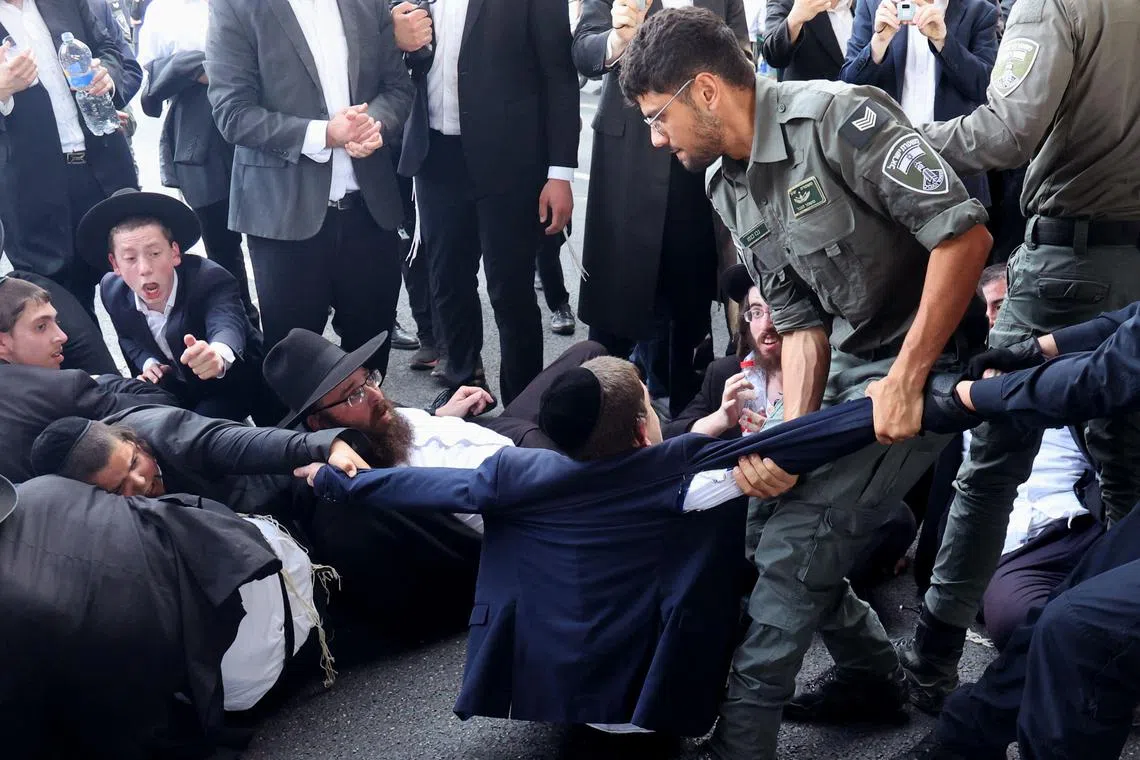Israeli decision to draft ultra-orthodox men into military faces political maelstrom
Sign up now: Get ST's newsletters delivered to your inbox

Israeli police removing a protester as they disperse Ultra-Orthodox Jews blocking a highway during a protest against the military draft.
PHOTO: AFP
Follow topic:
TEL AVIV – Israel is facing a legal and political struggle over how many ultra-orthodox men should be drafted into the military and how quickly, the result of an historic Supreme Court ruling.
Attorney-General Gali Baharav-Miara said the army should take on 3,000 ultra-orthodox recruits as soon as July 1
She also said the government must withhold funds previously allocated to religious seminaries whose students have been able to avoid the draft.
The court order to stop allowing ultra-orthodox men, known as Haredim, to skip Israel’s system of mandatory military service is unpopular with the group yet has strong broader support.
The exemption has stood since the early days of the state, and many Israelis say the burden of supplying forces to fight the ongoing war with Hamas and counter the threat from Hezbollah in Lebanon should be spread equally across society.
The decision has implications for Prime Minister Benjamin Netanyahu’s ruling coalition, which relies on two religious parties to function as a majority.
There are 1,800 Haredi soldiers in the Israel Defence Forces already. The court said about 63,000 are available, and the country must act quickly to enforce the new ruling given that Israel is at war.
Yet Mr Yuli Edelstein, a legislator in Mr Netanyahu’s Likud Party who runs the committee where the conscription law will be debated, said he will not push through any Bill that does not have broad support – meaning from the opposition as well as the coalition.
Political fallout
Mr Netanyahu and his religious partners want to minimise the numbers and pace of recruitment to limit the political fallout.
Rabbi Moshe Maya, the spiritual leader of Shas, one of the two Haredi parties in the coalition, urged resistance to conscription, saying: “Anyone who joins the army today will become a sinner tomorrow.”
But many of Mr Netanyahu’s fellow conservatives believe it’s vital for Haredim, who now number almost 14 per cent of Israel’s 10 million population, to be integrated into the army, especially as defence needs are growing.
Rivals to Mr Netanyahu, including within Likud, smell an opportunity to push for early elections.
In theory, the religious parties could leave the coalition and seek a better deal with other parties. Yet it seems more likely they will seek to minimise the ruling’s impact through internal negotiations.
Front pages
The front pages of Israel’s two biggest newspapers, which lean centre-right, carried ads on June 26 with words such as “Historic day! One Nation-One Army. Let the army win!”
Haredi papers, by contrast, reported on the ruling as a tragedy, with at least one framing its article with black lines, mimicking a death announcement.
One of their biggest concerns is that subsidies for yeshiva – where students go for religious study – will now be cut off, and some Haredi leaders called for donations.
One top rabbi wrote in a Haredi newspaper on June 25: “Dear brothers, help! The courts, haters of Torah students, have cut the budget of Torah and yeshivas with rage and malice.” BLOOMBERG

